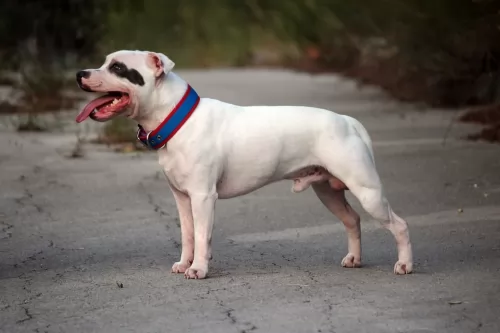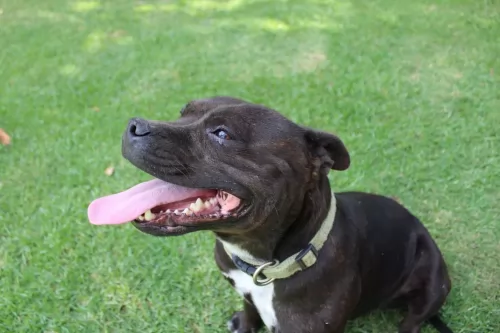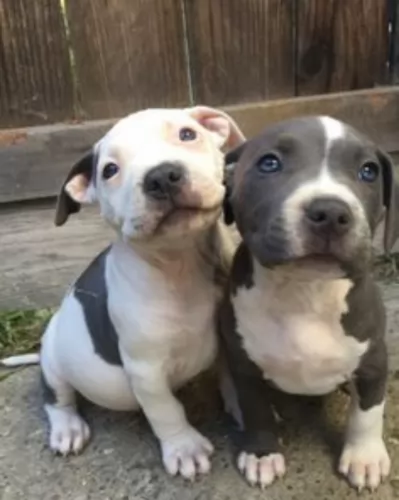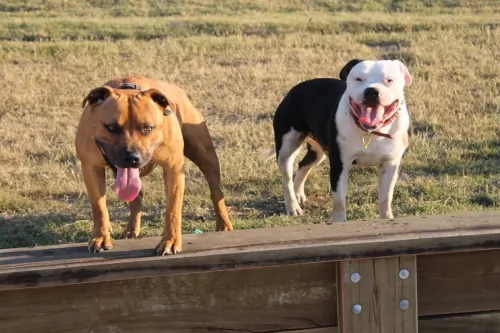 Petzlover
Petzlover Galgo Espanol is originated from Spain but Staffordshire Bull Terrier is originated from United Kingdom. Galgo Espanol may grow 26 cm / 11 inches higher than Staffordshire Bull Terrier. Galgo Espanol may weigh 12 kg / 27 pounds more than Staffordshire Bull Terrier. Both Galgo Espanol and Staffordshire Bull Terrier has same life span. Both Galgo Espanol and Staffordshire Bull Terrier has almost same litter size. Both Galgo Espanol and Staffordshire Bull Terrier requires Low Maintenance.
Galgo Espanol is originated from Spain but Staffordshire Bull Terrier is originated from United Kingdom. Galgo Espanol may grow 26 cm / 11 inches higher than Staffordshire Bull Terrier. Galgo Espanol may weigh 12 kg / 27 pounds more than Staffordshire Bull Terrier. Both Galgo Espanol and Staffordshire Bull Terrier has same life span. Both Galgo Espanol and Staffordshire Bull Terrier has almost same litter size. Both Galgo Espanol and Staffordshire Bull Terrier requires Low Maintenance.
 Galgo Espanol means Spanish with galgo meaning greyhound, thus a Spanish Greyhound. This breed is ancient with their roots in perhaps the English greyhound and others in the sighthound family. They are much like the greyhound in that they are laid back, calm, gentle and quiet, unless they are competing on the local track. Like the greyhound they are shy and reserved; great with kids and other pets. And of course, they love cats.
Galgo Espanol means Spanish with galgo meaning greyhound, thus a Spanish Greyhound. This breed is ancient with their roots in perhaps the English greyhound and others in the sighthound family. They are much like the greyhound in that they are laid back, calm, gentle and quiet, unless they are competing on the local track. Like the greyhound they are shy and reserved; great with kids and other pets. And of course, they love cats.
There are dogs like the Galgo referred to in writing by the ancient Celts and Romans. One author, Arrian, had his own Galgos and used them when hunting. The breed flourished in the second half of the Middle Ages in Spain and well into the 8th century. When the Christians regained control of the Iberian Peninsula, they did away with the hunter old forms of hunting and introduced a new form with hounds that made the Galgo the pride of the aristocracy and not in the homes of the ordinary people. Arrian claim to two types of dogs, the smooth and rough coated.
Muslim and Chrisitan Kings kept Galgo Espanols. In all probability the Saluke and Galgo were crossbred at this time. It was illegal to kill a Galgo and in 1081, the Mayor of Cartuario of Slonza left his Galgo in his will to Diego Citid. Dogs seen in painting from the 12th century look just like dogs of this breed who can be seen today.
It is believed that when the Galgo was developed, it was in the midsection of Spain or the Castillian plains. They ruled the interior of the country while the bloodhound ruled the exterior. The 18th and 19th centuries saw very little change in the breed. However, in the 20th century, there was cross breeding with the English greyhound that produced a leaner, faster and powerful track racing dog. The results was a faster dog without the long distance stamina of the pure Galgo. For this reason, the breeders returned to breeding the pure professional racing dog.
The sport of racing the Galgo earns Spain around sixty million dollars per year. They train anywhere from three to four thousand of the Galgos every year for Open Field Coursing Championships. Still, there no longer is any cross breeding between the Greyhound and the Galgo. The current coursing programs feature a hare that is much hardier and difficult to pursue so the stamina of the old Galgo Espanol is desired. In Castile, where these games are played, the landscape is open with large fields that requires that the hare travels far greater distances. This means that the stamina of the original Galgo Espanol is needed.
When not racing the Galgos have become great house pets. They have a reputation as gentle dogs that are docile and quiet, with good health. This reputation is well earned. They are also successful show dogs in Europe much more than the states. This is perhaps because they are really rare outside of Spain. They are not recognized by the United Kennel Club nor the American Kennel Club.
 The Staffordshire Bull Terrier was first developed in the northern sections of Birmingham and in Staffordshire, England. The Staffie is a cross between a Black and Tan Terrie and the Bulldog, but had other breeds crossed in over time in order to create a bull-baiting dog and a fighting dog. In the Victorian age these sports were banned but dog fighting went underground and continues on some level today.
The Staffordshire Bull Terrier was first developed in the northern sections of Birmingham and in Staffordshire, England. The Staffie is a cross between a Black and Tan Terrie and the Bulldog, but had other breeds crossed in over time in order to create a bull-baiting dog and a fighting dog. In the Victorian age these sports were banned but dog fighting went underground and continues on some level today.
The Staffordshire Bull Terrier was exceptional at these “sports” due to his build, power and jaw strength. Today’s Staffie is a descendent of those early Bull Terrier crosses. Together with the Bull Terrier and the American Pit Bull, the Staffie also traces its roots back to those original English Bully dogs. All three breeds have the Bulldog in common.
After dog fighting and bull baiting were banned the Stafforshire Bull Terrier was further developed as a companion and pet. Still their reputation as fighting dogs cost them recognition in the official kennel clubs for some time. They finally made the UK registry in 1935, but it was not until 1974 that the American Kennel Club (AKC) accepted them.
 Obviously the Galgos looks a lot like the Greyhound, but in some very important ways they are very different. The rear of the Galgos is higher than the front and their muscle are flatter. They are built for endurance while the Greyhound is built for speed. The Galgos is a lighter, smaller dog with larger ear on a long head. They have long tails and their chests are not deep like the Greyhounds.
Obviously the Galgos looks a lot like the Greyhound, but in some very important ways they are very different. The rear of the Galgos is higher than the front and their muscle are flatter. They are built for endurance while the Greyhound is built for speed. The Galgos is a lighter, smaller dog with larger ear on a long head. They have long tails and their chests are not deep like the Greyhounds.
The Galgo comes in smooth and rough coats and a variety of colors. The rough coat protects dogs that are in climates colder than the ones in Spain and also keeps them from injuring their skin while running. The colors include brindle, black, golden, toasted, cinnamon, yellow, red, white, white with patches, or any color as long as they have a white forehead and muzzle.
 The Staffordshire is a muscular, stocky and unusually strong breed, small to medium size in height and build. They have broad, powerful chests, wide set, strong legs, strong shoulders, broad head with a fairly short muzzle. Their ears are not cropped but they are short and fold over. The coat is stiff, close and short and the tail is medium and carried low. Most Staffies are brown, but they can be red, brindle with white, fawn, black, white or blue.
The Staffordshire is a muscular, stocky and unusually strong breed, small to medium size in height and build. They have broad, powerful chests, wide set, strong legs, strong shoulders, broad head with a fairly short muzzle. Their ears are not cropped but they are short and fold over. The coat is stiff, close and short and the tail is medium and carried low. Most Staffies are brown, but they can be red, brindle with white, fawn, black, white or blue.
 They are good with children, but you need to be careful no one gets knocked down or hurt.
They are good with children, but you need to be careful no one gets knocked down or hurt.
Stamina for running and a good record in lure coursing.
Though they can be couch potatoes like greyhounds they are better off with a fenced yard and not an apartment.
They are smart and can learn anything you want to teach them if you can keep their attention.
 1.Children friendliness The breed adores children but care should still be taken because they are so strong and their jaws are so powerful.
1.Children friendliness The breed adores children but care should still be taken because they are so strong and their jaws are so powerful.
2.Special talents they adore children and they one of the most powerful jaws among canines.
 Being a large dog, the Galgo Espanol would normally face a high probability of hip dysplasia. Fortunately for the breed this is not true. In this respect their lightness of weight, their history as a working dog and their anatomy have protected them from it. They are however susceptible to other issues.
Being a large dog, the Galgo Espanol would normally face a high probability of hip dysplasia. Fortunately for the breed this is not true. In this respect their lightness of weight, their history as a working dog and their anatomy have protected them from it. They are however susceptible to other issues.
Malignant tumors that quickly spread throughout the body. Life threatening.
As a sighthound, the Galgo Espanol is prone to have issues anytime with anesthetics. They don’t metabolize the anesthetics like other dogs do. They will take longer to revive, and they are susceptible to hypothermia while under an aesthetic.
While running, they are prone to injuries
 • Patella luxation otherwise known as a slipped kneecap- can cause pain and some lameness.
• Patella luxation otherwise known as a slipped kneecap- can cause pain and some lameness.
• Skin allergies and even a tendency toward Mange which is chronic in some forms and fatal in others.
• Like most active dogs their size, they are susceptible to bloat which can be fatal if not treated immediately.
 Feed your puppy a high quality dry food made for large breed dogs. Feed 3 meals a day 2.5 to 3 cups total for the day.
Feed your puppy a high quality dry food made for large breed dogs. Feed 3 meals a day 2.5 to 3 cups total for the day.
Feed your adult Galgo a high quality dry food made for large breed dogs. Feed 2 meals a day but don’t overfeed Give 4-5 cups total for the day.
They have amazing stamina and good speed. Generally good health as a breed.
He can be a couch potato indoors and runs forever outdoors. He does need daily exercise and bedrest both. The best would be if you could sprint him every day or have a small yard he can play in. They excel of course at agility and lure coursing. Keep them on a leash because if they run you will never catch them. The American Sighthound Field Association presents lure coursing events that they are eligible for. They have exceled at show competition in Europe but are not well known in the U.S.
 1.Feeding the puppy Don’t over feed as he grows fast. Feed a high quality dog food for medium size puppies. Feed 1-2 and a quarter cups in 3-4 meals per day.
1.Feeding the puppy Don’t over feed as he grows fast. Feed a high quality dog food for medium size puppies. Feed 1-2 and a quarter cups in 3-4 meals per day.
2.Feeding the adult Don’t exercise right before or after eating due to potential for bloat. Feed 1-2 times a day a high quality medium breed dog food.
4. Games and Exercises They are terriers after all and they dig. Need a fairly large yard with a strong fence. They love to play ball, frisbee and can excel at cart pulling.